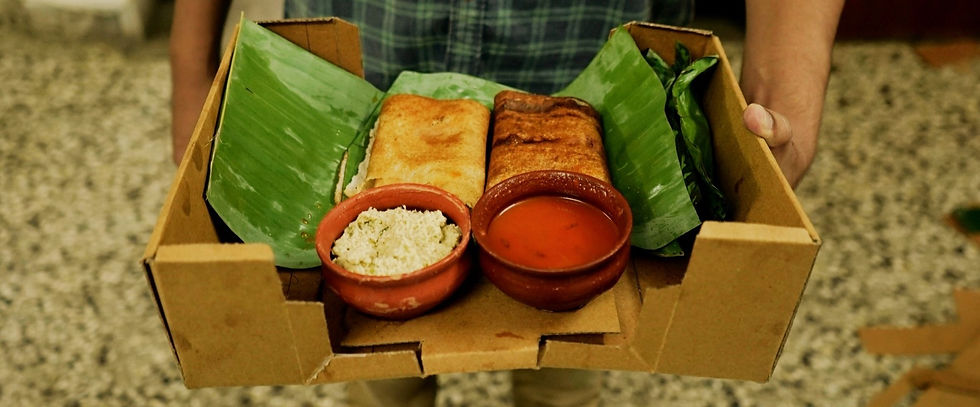ABOUT US

ID
Client-based
Sustainable Packaging Design
Our Aim.
To design environment-friendly packaging
that is easy to store, carry, dispose, and eat-in while solving the leakage of liquid food.
The Challenges.
-
Selection of material: Natural or Reusable.
-
Packing of liquid food without using plastic
-
Separating food in compartments without leakage
-
Solving the problem of standing and eating


The Research.
We visited the ID outlets in Chennai and studied the issues with the existing packaging.
-
Apart from spillage, there was the issue of the liquid mixing with the solid food and creating sogginess.
-
The existing package came in aluminum making it quite hard to eat at railway stations, especially standing up due to the heat.
-
Holding the hot package upright and eating while standing also led to stability issues as the package tended to lose balance.
-
Stackability would also have to taken into consideration since most customers ordered more than one parcel and carrying had to be easy.
ID Food Analysis.
Studied the main menu of ID to categorize and understand the food items and design according to the specifications.
.png)
Material Exploration.
Studied the main menu of ID to categorize and understand the food items and design according to the specifications.

CLAY
BAGASSE
BANANA LEAF
ALUMINIUM
FOIL
CARD
BOARD

Banana Leaf
A
.png)
Pros
-
Easy to procure and transport
-
Portrays the nature of south Indian packaging and enhances the overall aesthetics
Cons
-
Can be used mainly as secondary packaging
-
Cannot be stored for a long time

Cardboard
C
%20-%20Copy.png)
Pros
-
Cardboard can be recycled
-
It provides a sturdy structure
Cons
-
Cannot be used for liquid food
-
Only geometrical shapes can be formed and not organic
E
Aluminium

.png)
Pros
-
Available in multiple shapes and sizes
-
Cheap manufacturing process
-
Keeps food warm for long amounts of time
Cons
-
Leakage from one compartment to another

Bagasse
B
.png)
Pros
-
Aesthetically appealing
-
Can be sealed using banana leaves/ aluminium/butter paper
Cons
-
Environmental impact is higher during manufacturing process (considering water and power use)
-
Final cost is higher then most options
Areca Nut
D

.png)
Pros
-
Easy manufacturing process
-
Strong and sturdy to use
-
Can be shaped and compartmentalized
Cons
-
Cannot be leak-proof as structure does not comes out uniform in manufacturing
-
Raw material quality is inconsistent
F
Clay

%20-%20Copy.png)
Pros
-
Same manufacturing as plastic (available in numerous options)
Cons
-
Biodegradable only under Industrial conditions
(collection and segregation is hard after usage)
Ideation.



After analyzing the various pros and cons of different materials, we ideated taking into consideration, the
• Durability
• Environment-friendly material
• Stackability
• Ease of use
• Least material wastage
• Spill Proof
Trials.
Trial 1
Material: Cardboard + Aluminium/Bagasse/Kullad pots
Ease of use: Can be held with one hand
Stackability : 70% efficient
Spillage: 95% prevented
Material: Aluminium + Cardboard
Ease of use: Hard to hold with one hand
Stackability: 9 7% efficient
Spillage: 80%prevented
Trial 2





Concept 1

Rubber Bands
Banana Leaf
Burnt Banana Leaf
Cardboard
Packaging
Clay Pots
Assembly and Packaging.
Unwrapping.

Concept 2

Rubber Bands
Burnt Banana Leaf
Banana Leaf
Clay Pots
Cardboard
Packaging
Assembly and Packaging.
Unwrapping.
Baggase Concepts.
Experimenting with the lips to provide a sound structure and at the same time prevent spillage
-
Separating the compartments using multiple depressions to prevent spillage
-
Separating the compartments with an extrusion by increasing area

A
B
Inspired from a tiffin box and exploring the possibility of completely separating the liquid from the solid food with the main dish on top and the liquid underneath

C
Separate lids for chutney and sambhar with one overall lid to prevent spillage with the application of pressure from the top lid.





1
2
3
4
Basic
Kids Meal
Tiffin Box
Combo